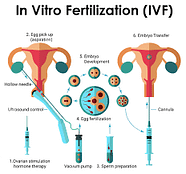Introduction:
In recent times, In-Vitro Fertilization (IVF) has emerged as a beacon of hope for couples grappling with infertility issues. IVF is a sophisticated medical procedure that has enabled countless couples to realize their dreams of becoming parents. In this comprehensive guide, we will delve into the intricacies of IVF, discussing what it entails, its advantages and disadvantages, the procedures involved, the costs associated with it, and crucial precautions to consider before and after undergoing IVF treatment.

IVF
What is IVF?
IVF, or In-Vitro Fertilization, is a fertility treatment that involves the fertilization of an egg with sperm outside the female body. The resulting embryos are nurtured and developed in a laboratory setting before being carefully implanted into the woman’s uterus. This technique provides an alternative route to achieving pregnancy for couples who have faced difficulties conceiving through natural means.
Advantages of IVF:
1. Increased Pregnancy Success Rates: IVF has been proven to significantly enhance the chances of pregnancy, particularly for couples struggling with infertility issues such as blocked fallopian tubes, low sperm count, or endometriosis.
2. Controlled Environment:IVF allows for precise control over the fertilization process, enabling doctors to monitor and adjust conditions for the best possible outcome.
3. Genetic Testing: Preimplantation Genetic Testing (PGT) can be performed during IVF, helping to identify genetic abnormalities and select healthy embryos for implantation.
4. Overcoming Male Infertility: IVF can overcome male infertility problems, such as low sperm count or poor sperm motility, by directly injecting sperm into the egg.
Disadvantages of IVF:
1. Emotional and Psychological Stress:The emotional rollercoaster of IVF can be mentally taxing for couples, with the possibility of repeated cycles and uncertain outcomes
2. Physical Discomfort: IVF involves hormone injections and frequent monitoring, which can lead to physical discomfort and side effects.
3. Multiple Pregnancies: IVF carries a higher risk of multiple pregnancies, which can be challenging for both the mother and babies.
4. Cost: IVF can be expensive, and success is not guaranteed, leading to financial strain for many couples.
IVF Procedures:
The IVF process typically involves the following steps:
1. Ovulation Stimulation:Fertility medications are administered to stimulate the ovaries to produce multiple eggs.
2. Egg Retrievalnce the eggs are mature, a minor surgical procedure is performed to retrieve them from the ovaries.
3. Sperm Collection:A sperm sample is collected from the male partner or a sperm donor.
4. Fertilization:Eggs and sperm are combined in a laboratory dish for fertilization to occur.
5. Embryo Culture:Fertilized eggs are cultured and monitored for several days.
6. Embryo Transfer: The healthiest embryos are selected and carefully transferred into the woman’s uterus.
7. Luteal Phase Support:Hormonal medications are administered to support the uterine lining and facilitate embryo implantation.
Cost of IVF in Major Countries, Including India:
The cost of IVF can vary significantly from one country to another. Here’s a brief overview of the approximate costs in major countries, including India:
1. United States: IVF in the USA can range from $12,000 to $15,000 per cycle, excluding medications.
2. United Kingdom: IVF costs in the UK can vary, with one cycle averaging around £5,000 to £7,000.
3. Australia:In Australia, IVF can cost between AUD $8,000 and AUD $12,000 per cycle.
4. Canada:IVF expenses in Canada range from CAD $10,000 to CAD $15,000 per cycle.
5. India:IVF in India is comparatively more affordable, with costs ranging from INR 80,000 to INR 2,50,000 per cycle.
It’s important to note that these costs can fluctuate depending on various factors, including the clinic’s location, the specific treatments required, and any additional services such as genetic testing.
Precautions Before and After IVF:
Before embarking on the IVF journey, it’s crucial to take certain precautions to maximize your chances of success and minimize potential risks. Here are some key precautions to consider:
Before IVF:
1. Consultation with Fertility Specialist: Seek consultation with a qualified fertility specialist who can assess your individual case and provide personalized guidance.
2. Lifestyle Changes: Adopt a healthy lifestyle by maintaining a balanced diet, regular exercise, and stress management.
3. Medication Adherence: Follow your doctor’s instructions regarding fertility medications meticulously.
4. Emotional Support: Consider seeking emotional support through counseling or support groups to cope with the emotional challenges of IVF.
5. Financial Planning: Understand the financial implications of IVF and plan accordingly to reduce stress.
After IVF:
1. Rest and Recovery: After embryo transfer, take adequate rest and avoid strenuous activities.
2. Medication Compliance: Continue taking prescribed medications as directed by your doctor.
3. Stress Reduction: Implement stress-reduction techniques such as yoga, meditation, or deep breathing exercises.
4. Follow-Up Appointments: Attend all follow-up appointments to monitor the progress of your pregnancy.
5. Healthy Lifestyle: Maintain a healthy lifestyle throughout pregnancy by eating well, staying hydrated, and avoiding harmful substances.
In conclusion, IVF is a revolutionary fertility treatment that has offered hope to countless couples worldwide. While it comes with its advantages and disadvantages, the decision to undergo IVF should be made after careful consideration and consultation with a fertility specialist. Understanding the costs involved, both financially and emotionally, is essential. By taking necessary precautions before and after IVF, you can increase your chances of a successful outcome and realize your dream of parenthood.





